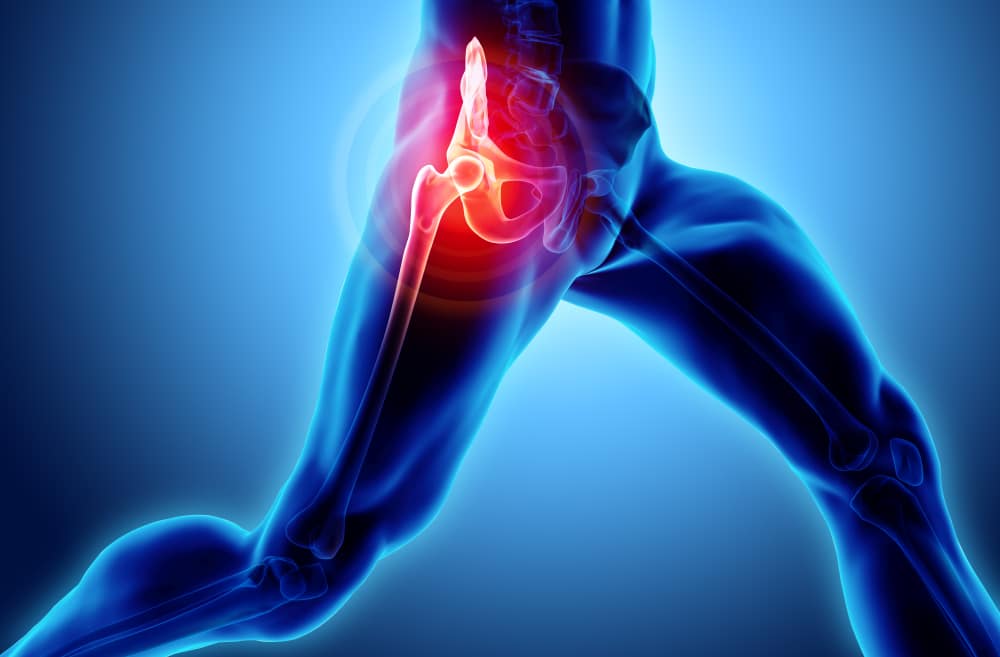If you have had a hip replacement and have experienced problems with the new joint, you may be a candidate for hip revision surgery. Initial hip replacements are very successful for most patients and provide lasting pain relief for many years. However, some patients may need a second hip replacement procedure due to infection, implant wear, or injury. This second hip procedure is called hip revision surgery or revision total hip replacement.
If issues develop with the existing implant, the need for hip revision surgery can arise soon after the original surgery or several years later. If you experience any issues with your original hip replacement implant, it is important to seek out an orthopedic surgeon like Dr. Amer Mirza – a hip, knee, and revision specialist – with experience in hip revision surgery. Joint replacement revisions are more complex than the original procedure and require specialized skills for the best possible results.

Who Would Be an Ideal Candidate for Hip Revision Surgery?
Most patients will not need a revision procedure after the original hip replacement. For some patients, however, hip revision surgery may be necessary due to:
- Loosening of the implant over time – Hip replacement implants may function well for several years, but over time, the implant can loosen from the bone. This can be very painful and may require revision surgery to correct. Patients who frequently participate in high-impact activities or are overweight may have an increased risk of implant loosening.
- Wear on the implant over time – The implant's plastic liner can wear down over time, creating tiny particles that are attacked by the body's immune system. Moreover, the immune system can also attack and deteriorate the surrounding bone while trying to eliminate the plastic particles, creating a condition called osteolysis. As the bone deteriorates, the implant may become loose.
- Infection – An infection may occur after the initial hip replacement procedure. An infected hip replacement can cause implant loosening, pain, instability, and drainage. It is difficult to eliminate the infection in a hip replacement with antibiotics alone, so revision surgery is often needed to replace the original implants and clear the infection.
- Fracture – If one or more of the bones surrounding the hip implant are fractured, this may cause the implant to loosen, requiring revision surgery to correct.
What Is Involved in Hip Revision Surgery?
Because hip revision surgery is more complex than the original hip replacement procedure, it typically takes longer for your surgeon to perform.

Your surgeon will make an incision in the same location as the original hip replacement, but it may need to be a larger incision to allow for the removal of the old implants. Our surgeon, Dr. Amer Mirza, takes care to preserve as much healthy bone as possible while removing the original implants, which can be very time-consuming, particularly if bone cement was used to hold the original implant in place. In some cases, Dr. Mirza may need to perform a controlled break of the femur (thighbone) to remove the stemmed implant.
Once the original implants have been removed, Dr. Mirza will prepare the bones for the new implant. Revision implants are often larger than the original implants to make up for the bone loss. Metal augments may also be added to the implant for this reason so that the hip is in proper alignment.
If hip revision surgery is needed due to an infection, Dr. Mirza may simply be able to wash the bacteria out of the joint and replace the ball and plastic spacer. The patient is then given antibiotics for several weeks until the infection clears.
In other infection cases, all hip implant components may need to be removed to clear the infection. In these cases, the surgery is done in a staged approach. First, Dr. Mirza removes the implants and places a temporary spacer in the hip that is treated with antibiotics. The patient is then given intravenous antibiotics until the infection clears. In the second stage of the hip revision, Dr. Mirza goes back in and places the new implants.
How Long Does It Take to Recover From Hip Revision Surgery?
The recovery process for hip revision surgery is similar to what you experienced with the original hip replacement, but it may be a longer process. Most patients need to stay in the hospital for at least a few days after surgery. After returning home, you will likely need assistance for several days or weeks until you are able to walk on your own. Medications will be given to help with the pain. Physical therapy is an important part of your recovery process. Physical therapists work with you to strengthen the leg and restore function in the hip. Most patients are able to resume all normal activities within 6-8 weeks of surgery.
How Do I Know if My Hip Implant Has Loosened?
If you suspect your hip implant has loosened, symptoms might include:
- Persistent pain
- Instability in the joint
- A noticeable change in mobility
- Swelling
- Discomfort when bearing weight
- A sensation that the hip feels "off"
Imaging studies, like X-rays or CT scans, can confirm this diagnosis. If you're experiencing these symptoms, consult Dr. Mirza for an evaluation.
Are There Risks of Blood Clots After Hip Revision Surgery?
Yes, there is a risk of blood clots after hip revision surgery. Due to the nature of the surgery and the recovery period that follows it, patients are often more susceptible to blood clots, particularly in the legs. To reduce this risk, Dr. Mirza recommends preventive measures, including:
- Blood-thinning medications
- Compression devices
- Movement as soon as safely possible
Dr. Mirza is highly experienced in hip revision surgery. He takes all precautions to ensure patient safety and deliver optimal results.
What Are the Different Materials Used in Hip Revision Implants?
Hip revision implants are made from various materials designed to provide durability, biocompatibility, and support. Common materials include:
- Metals: Metals like titanium or cobalt-chromium alloys are strong and corrosion-resistant.
- Ceramics: Ceramics offer smooth surfaces and lower friction within the joint.
- Polyethylene: Polyethylene is a medical-grade plastic used for its flexibility and shock-absorbing qualities.
The choice depends on individual factors like bone quality, surgeon preference, and patient lifestyle. Each material offers unique benefits to support successful outcomes in hip revision surgery.
How Can Lifestyle Factors Impact the Longevity of a Revised Hip Implant?
Lifestyle factors can significantly impact the longevity of a revised hip implant. Here are some of the most noteworthy factors to keep in mind:
- Activity: Activities like high-impact sports or heavy lifting may increase wear on the implant. This can potentially shorten its lifespan.
- Weight: Maintaining a healthy weight reduces stress on the hip joint.
- Healthy habits: Avoiding smoking and excessive alcohol improves bone health and healing. This supports a longer-lasting implant.
Is Hip Revision Surgery Recommended for Younger Patients?

Dr. Mirza sometimes recommends hip revision surgery for younger patients when their initial hip replacement has worn down or failed.
Younger, active individuals may experience implant wear or loosening more quickly. This is due to a higher activity level, which increases stress on the joint.
Revision surgery is generally more complex. However, it can improve quality of life, reduce pain, and restore mobility.
Why Choose Summit Orthopaedics?
Choosing Summit Orthopaedics means benefiting from Dr. Amer Mirza's expertise in adult arthritis and joint replacement surgery.
Dr. Mirza, board-certified by the American Academy of Orthopaedic Surgeons (AAOS), brings a personalized approach to care. He helps patients of all ages to manage pain, regain function, and return to their active lifestyles.
As vice president of the Oregon Association of Orthopaedic Surgeons (OAOS) and a five-time honoree as one of Portland Monthly's "Top Doctors," Dr. Mirza is a recognized leader in his field. He is committed to providing high-quality, compassionate orthopedic care to patients throughout the Portland area.
Hip Revision Surgery in Portland, Oregon
Our board-certified orthopedic surgeon, Dr. Amer Mirza, is experienced in handling complex joint surgery cases like hip revision surgery for our patients at Summit Orthopaedics.
If you think you may be a candidate for hip revision surgery and would like an evaluation, please call our office at 503-850-9940 or contact us online to request an appointment.

